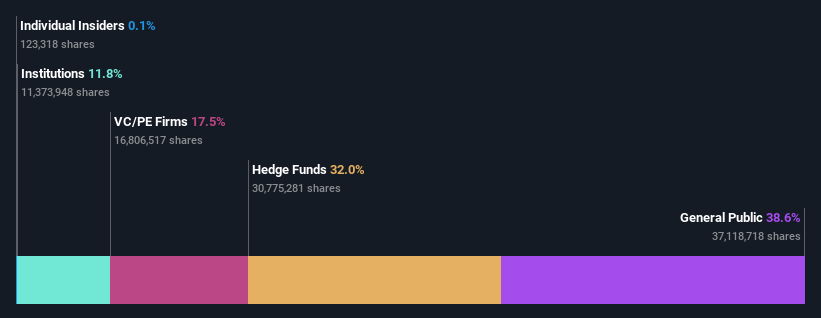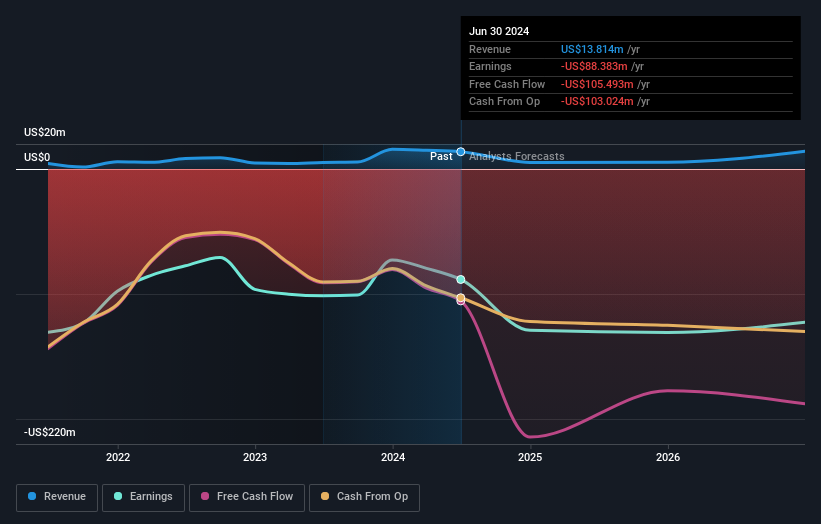DBV Technologies S.A.'s (EPA:DBV) largest shareholders are retail investors who were rewarded as market cap surged €25m last week

Key Insights
- Significant control over DBV Technologies by retail investors implies that the general public has more power to influence management and governance-related decisions
- The top 4 shareholders own 53% of the company
- Recent sales by insiders
To get a sense of who is truly in control of DBV Technologies S.A. (EPA:DBV), it is important to understand the ownership structure of the business. And the group that holds the biggest piece of the pie are retail investors with 39% ownership. In other words, the group stands to gain the most (or lose the most) from their investment into the company.
As a result, retail investors collectively scored the highest last week as the company hit €93m market cap following a 37% gain in the stock.
In the chart below, we zoom in on the different ownership groups of DBV Technologies.
View our latest analysis for DBV Technologies

What Does The Institutional Ownership Tell Us About DBV Technologies?
Institutions typically measure themselves against a benchmark when reporting to their own investors, so they often become more enthusiastic about a stock once it's included in a major index. We would expect most companies to have some institutions on the register, especially if they are growing.
DBV Technologies already has institutions on the share registry. Indeed, they own a respectable stake in the company. This can indicate that the company has a certain degree of credibility in the investment community. However, it is best to be wary of relying on the supposed validation that comes with institutional investors. They too, get it wrong sometimes. It is not uncommon to see a big share price drop if two large institutional investors try to sell out of a stock at the same time. So it is worth checking the past earnings trajectory of DBV Technologies, (below). Of course, keep in mind that there are other factors to consider, too.

It would appear that 32% of DBV Technologies shares are controlled by hedge funds. That worth noting, since hedge funds are often quite active investors, who may try to influence management. Many want to see value creation (and a higher share price) in the short term or medium term. Baker Bros. Advisors LP is currently the largest shareholder, with 32% of shares outstanding. VR Adviser, LLC is the second largest shareholder owning 10% of common stock, and Bpifrance Participations SA holds about 7.4% of the company stock.
To make our study more interesting, we found that the top 4 shareholders control more than half of the company which implies that this group has considerable sway over the company's decision-making.
Researching institutional ownership is a good way to gauge and filter a stock's expected performance. The same can be achieved by studying analyst sentiments. There are plenty of analysts covering the stock, so it might be worth seeing what they are forecasting, too.
Insider Ownership Of DBV Technologies
While the precise definition of an insider can be subjective, almost everyone considers board members to be insiders. Company management run the business, but the CEO will answer to the board, even if he or she is a member of it.
Most consider insider ownership a positive because it can indicate the board is well aligned with other shareholders. However, on some occasions too much power is concentrated within this group.
Our most recent data indicates that insiders own less than 1% of DBV Technologies S.A.. It has a market capitalization of just €93m, and the board has only €120k worth of shares in their own names. Many tend to prefer to see a board with bigger shareholdings. A good next step might be to take a look at this free summary of insider buying and selling.
General Public Ownership
The general public-- including retail investors -- own 39% stake in the company, and hence can't easily be ignored. While this size of ownership may not be enough to sway a policy decision in their favour, they can still make a collective impact on company policies.
Private Equity Ownership
With an ownership of 17%, private equity firms are in a position to play a role in shaping corporate strategy with a focus on value creation. Some investors might be encouraged by this, since private equity are sometimes able to encourage strategies that help the market see the value in the company. Alternatively, those holders might be exiting the investment after taking it public.
Next Steps:
I find it very interesting to look at who exactly owns a company. But to truly gain insight, we need to consider other information, too. For instance, we've identified 3 warning signs for DBV Technologies (2 are significant) that you should be aware of.
If you would prefer discover what analysts are predicting in terms of future growth, do not miss this free report on analyst forecasts.
NB: Figures in this article are calculated using data from the last twelve months, which refer to the 12-month period ending on the last date of the month the financial statement is dated. This may not be consistent with full year annual report figures.
New: Manage All Your Stock Portfolios in One Place
We've created the ultimate portfolio companion for stock investors, and it's free.
• Connect an unlimited number of Portfolios and see your total in one currency
• Be alerted to new Warning Signs or Risks via email or mobile
• Track the Fair Value of your stocks
Have feedback on this article? Concerned about the content? Get in touch with us directly. Alternatively, email editorial-team (at) simplywallst.com.
This article by Simply Wall St is general in nature. We provide commentary based on historical data and analyst forecasts only using an unbiased methodology and our articles are not intended to be financial advice. It does not constitute a recommendation to buy or sell any stock, and does not take account of your objectives, or your financial situation. We aim to bring you long-term focused analysis driven by fundamental data. Note that our analysis may not factor in the latest price-sensitive company announcements or qualitative material. Simply Wall St has no position in any stocks mentioned.
About ENXTPA:DBV
DBV Technologies
A clinical-stage biopharmaceutical company, engages in the research and development of epicutaneous immunotherapy products in France.
Moderate with mediocre balance sheet.
Similar Companies
Market Insights
Community Narratives


